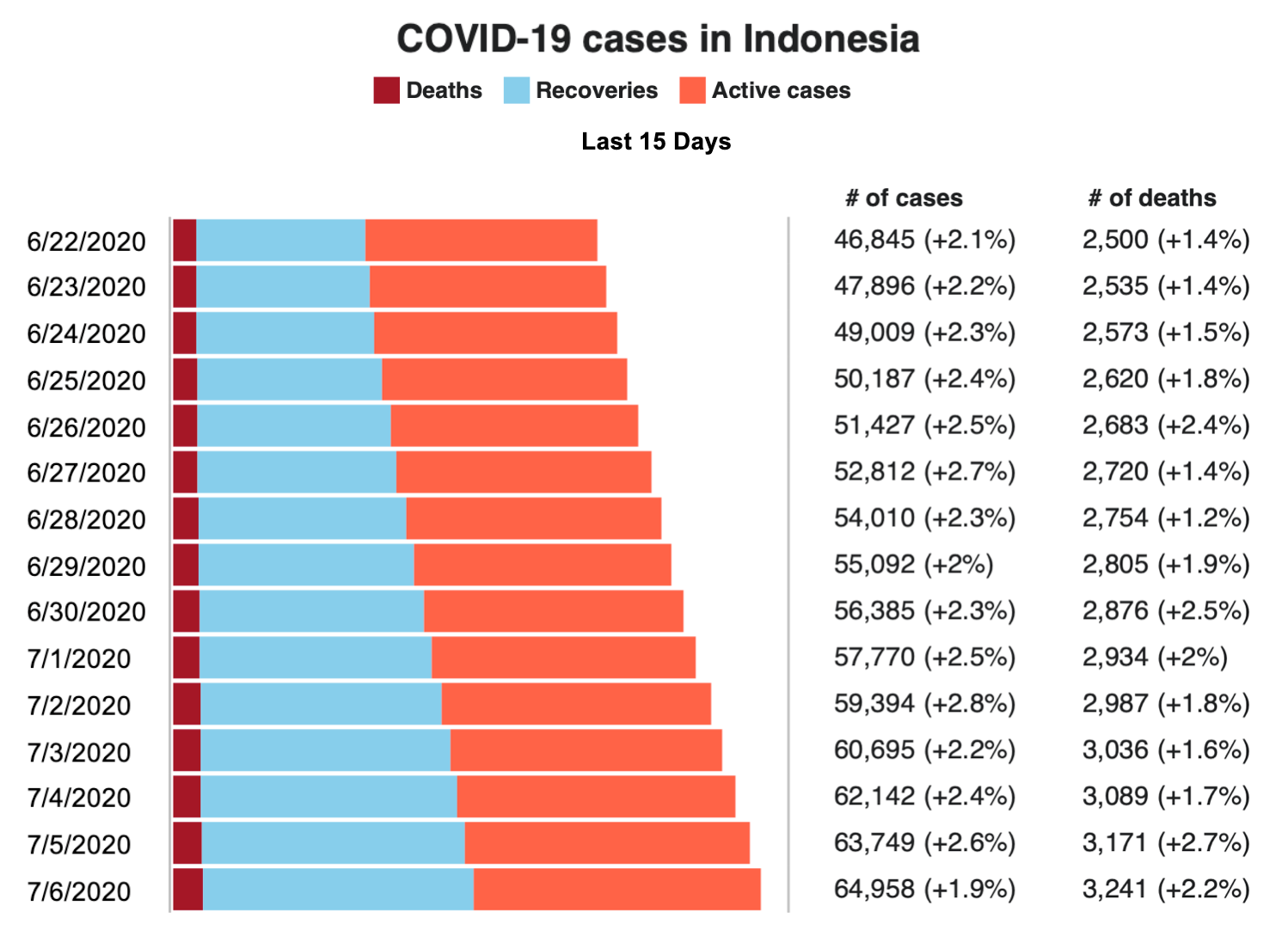Indonesia Coronavirus Update #19 July 6, 2020

Number of reported cases: 64,958 (as of July 6) 3241 Deaths 29,919 Recoveries
Rupiah to US$ 14,440
Jakarta Stock Exchange Index: 4988
Overview
Indonesia reported 82 deaths from coronavirus-related diseases on Sunday, the highest single-day fatalities since the outbreak, to take the total death toll to 3,171, according to the National Covid-19 Task Force. The previous high of daily deaths was 71 on Tuesday. Case growth continues to steadily grow by 15% on a week-on-week average with rates higher in East Java and some provinces outside Java. Transmission rates are relatively moderate with death rates far below the US, UK, Brazil, Italy, France, and Russia. However, concerns remain that the current mitigation efforts are not curtailing case growth. Like residents of nations all over the world, large numbers of Indonesians are not closely observing social distancing and mask wearing protocols. The mayor of Surabaya in East Java, Tri Rismaharini, (one of Indonesia’s most highly acclaimed local administrators) broke down in tears when criticized by health officials over the overcrowding in the city’s health facilities. The incident highlighted the painful choices inherent in opening the economy and public health. Similarly, the usually mild-mannered President Jokowi erupted during a Cabinet meeting over the failures of some of his ministers to take more extraordinary measures to counter the pandemic and get relief to those most in need. Apparently only 2% of emergency funds has emerged from government bureaucracies. Jokowi threatened a Cabinet shuffle. Soon after the Presidential office released a video of the President’s tirade, an unofficial list of new appointees surfaced on social media.
Travel:
- AMINEF, the foundation in Jakarta that handles the Fulbright and Hays international scholar programs, reports that new Indonesian Fulbright grantees cannot yet get their US visas processed and may have to attend the fall semester remotely. However, current holders of valid US education exchange visas (J, F,M) can re-enter.
- Normal foreign tourist and business visas are currently not being processed by Indonesian consulates and embassies, although exceptions are being made for business personnel seeking to follow up on a direct investment project.(Contact AICC for more details.) Estimates of the date when these visas will again be issued vary but most knowledgeable commentators are indicating that things will not reopen until after September 1, 2020.
Economic:
- BI Bond Purchase- Indonesia’s central bank has committed to purchasing $40 billion of government bonds (rupiah denominated) to help finance the 2020 fiscal deficit, which is forecast to reach 6.34% of GDP this year, as the government steps up spending to fight the virus outbreak while revenue drops.
- Chinese Relocations – President Jokowi visited the north coast area of Batang (west of Semarang) where the government intends to build an industrial park to settle corporations relocating production from China. He indicated 7 companies (mostly from East Asia) have agreed to invest $850 million. A US maker of home solar lights, Alpan, was the only US company in the list.
- REDD payment- With a flourish in 2010, Indonesia, under then President Soesilo Bambang Yudhoyono, announced an agreement with Norway where Indonesia would receive $1 billion if it agreed to reduce deforestation and control CO2 greenhouse gas emissions. After years of conflicting definitions of deforestation as well as a change in which Indonesia government authority would manage coordinate the program, Indonesia has qualified for its first payment, although the amount was not released.
Foreign Affairs
An editorial in the influential Jakarta Post reflected a growing concern over waning US influence in the region. Commenting on a recent visit of Defense Minister Prabowo to Russia to finalize a $1.1 billion purchase of military jets, the Post wrote:
“Amid the diminishing might and global influence of the United States, especially under President Donald Trump, and in the middle of tension in the South China Sea and the COVID-19 pandemic, Indonesia should intensify bilateral and multilateral relations with major powers. These include Russia, whose prominence in military and technology has shaped it as a key player in the international political landscape.”





